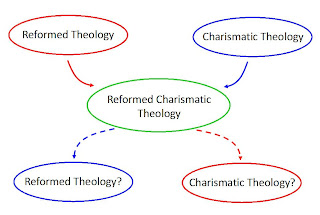I’ve heard this term bandied around a bit of late and recently it came to my attention that quite a few people feel unnerved by the phrase.
Eminent bible teacher and preacher Philip Jensen has a go at tackling the issue here.
Jensen rightly points out that classical Charismatic theology and classical Reformed theology are incompatible. His thoughts are helpful in thinking through these terms.
However, Jensen rightly points out at the beginning of his discussion that words can be redefined by just about anyone. While his discussion is helpful in considering the classical positions of Charismatic and Reformed theology, I cannot help but feel that Jensen hasn’t done quite enough to discuss the new wave of ‘Reformed Charismatic’ movements which appear to be coming from the US (with guys like CJ Mahaney, John Piper and Mark Driscoll as the common faces of the movement – though to my knowledge these men have not used the phrase ‘Reformed Charismatic’ to describe themselves). This new wave appears to happily use the term ‘Reformed Charismatic’ to identify themselves while at the same time disassociate themselves from ‘Classical Charismaticism’. Jensen speaks firmly, and I think appropriately, on the issue of whether classical Charismatic theology can be reconciled with classical Reformed theology – but he doesn’t speak on the issue of how this new wave of ‘Reformed Charismatics’ define themselves and their teaching.
At this point I defer to a blog post by CJ Mahaney who defines himself as ‘Reformed’ in his understanding of the doctrines of Grace (soteriology) and ‘Charismatic’ in his continuationist beliefs regarding the Holy Spirit’s gifts. Classical Charismaticism defined itself partly in the requirement that a believer demonstrate gifts of the Holy Spirit, in particular tongues (as a sign of baptism by the Holy Spirit). This position inevitably creates a tiered system of faith – those who are Christians but yet to experience the ‘baptism of the Holy Spirit’ and those who have had the experience and are more ‘complete/full/better’. This position, of course, is inherently unbiblical.
However does holding a continuationist position (that the gifts of the Spirit, those listed in 1 Corinthians 12-14 in particular, continue to this day) necessarily contradict holding a Reformed position? At this point I defer to the works of well respected Evangelical scholars such as DA Carson (Showing the Spirit: A Theological Exposition of 1 Corinthians, 12-14), JI Packer (Keep in Step With the Spirit) and Wayne Grudem (Systematic Theology edit: it has been brought to my attention by a trusted and more learned brother that Grudem comes from a slightly different theological background than Carson or Packer – so his material needs to be read with a little bit more discernment). Leading voices in Evangelical thought and scholarship who agree that the gifts of the Spirit continue to this day, but (and this is an important but!) with sanctions on their use as determined and restricted by Scripture (as found in 1 Corinthians 12-14).
Recently John Woodhouse, principal of Moore Theological College, had a go at answering the question. Here are his (brief) thoughts on the issue:
I think Woodhouse does a very good job at answering the question in an insightful and humble manner. Picking up on one of his points I’d like to close with some things we can do in response.
Firstly – know where things are coming from. Woodhouse rightly points out that the ‘Reformed Charismatic’ camp seems to stem from two different places – one founded in Reformed theology and one founded in Charismatic theology. Let me illustrate with this diagram…

The tension behind this debate is probably based in the unknown potential of where each theology is heading. Logically it works out, as the diagram shows, that those coming from a Charismatic background will more logically moved towards a stronger Reformed theology and vice versa. But this is only potential – it may or may not happen. But I think it’s helpful to know where someone is coming from to know possibly where they might move to next.
Secondly – be discerning. As Woodhouse rightly points out, this is a new “fad” (I use the term very loosely). Don’t simply jump onboard because everyone else is. Test the teaching that you are hearing against scripture and pray about it. If no warning lights come on then pray for your own heart, that what you are hearing or reading would implant in you a desire towards godliness, faithfulness and fruitfulness.
Thirdly – (carried from the last point) don’t be overly critical. Throughout the history of the church God has worked in waves of revival. We should welcome any such revival in the churches grounded upon God’s Word and work hard to ensure that the effects are long lasting.
Finally – don’t forsake the past. The tension of this debate threatens to drive a wedge between faithful older generations and faithful younger generations. The Reformed Charismatic movement is predominantly a younger generation movement. If you are caught up in the wave do your utmost to maintain unity within the body. It will be a terrible indictment upon the movement if its proponents forsake the fertile ground prepared for them by hard working older generations. Both generations need to remember that ultimately it is God who brings growth – one generation might do the sewing and planting, another does the watering – and both are equally important for the fruit of God’s Word to grow.
I am intensely interested to hear Woodhouse’s view regarding the cessationist/continuationist debate. No doubt he will be well thought out – but I’ll have to wait for another time to ask that question. Perhaps if I ever bump into him I’ll take him out for some coffee and ask!

Comments are closed